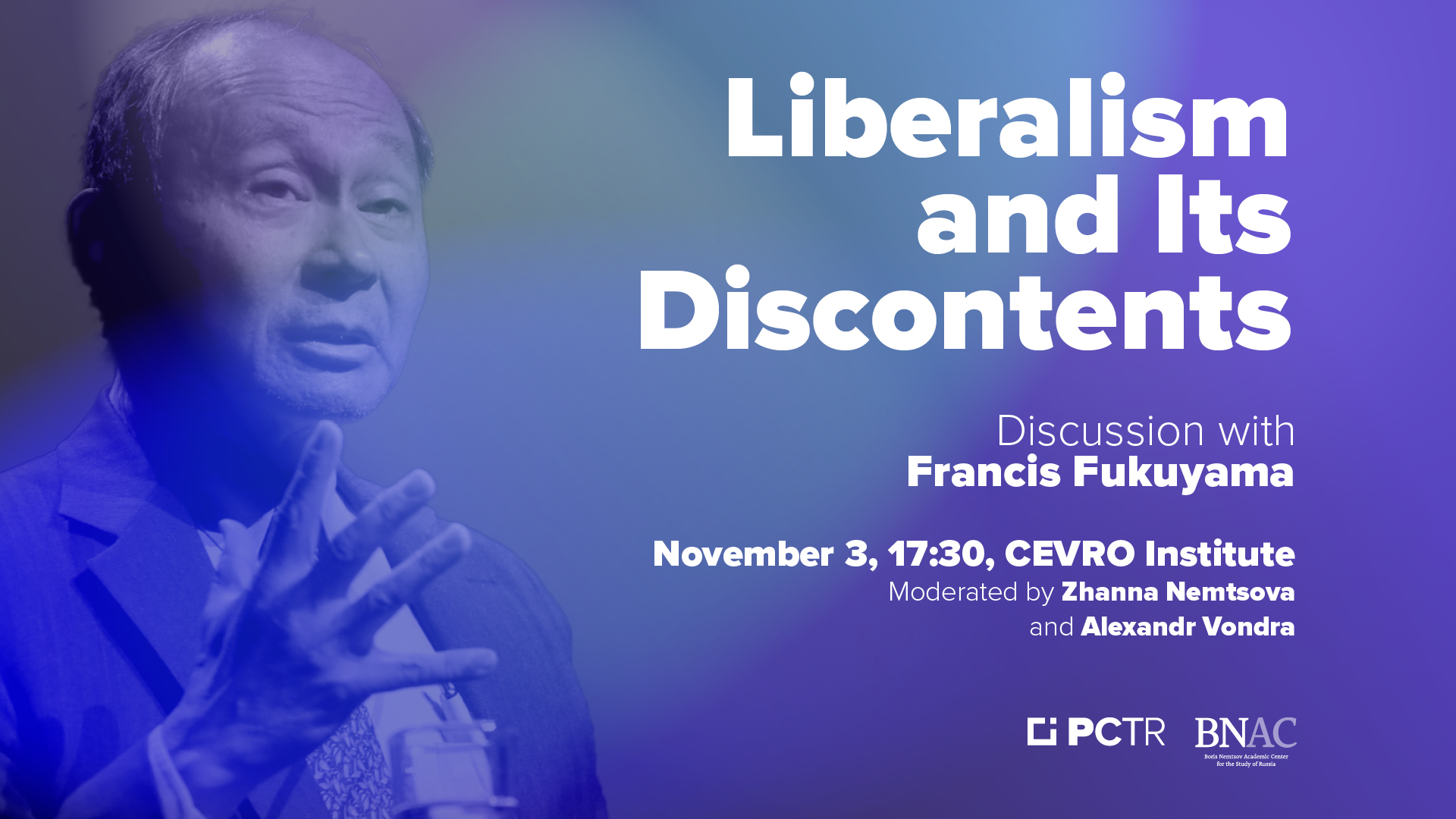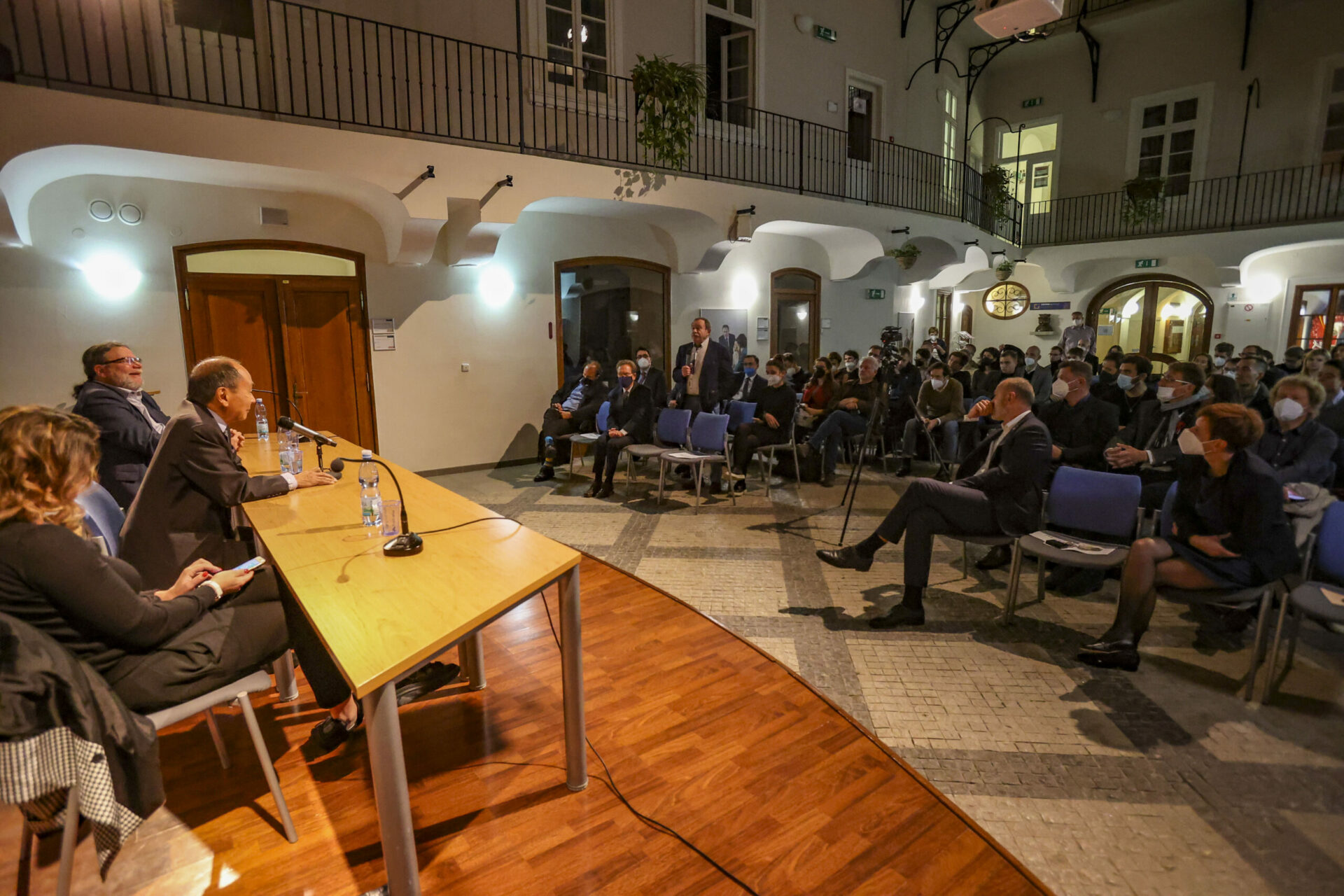Liberalism and its discontents: a discussion with Francis Fukuyama
Date of event: 3.11

A discussion with Francise Fukuyama took place on the 3rd of November from 5:30 PM at the CEVRO Institute.
The name of the debate is the same as his book, which will be coming out in the spring: Liberalism and Its Dicontents.
The discussion was organized together with the Boris Němcov academic center and was moderated by Žanna Němcovová and Alexandr Vondra.
Francis Fukuyama is an American philosopher and political scientist. He currently works at Standford University. He is the author of numerous books.
Francis Fukuyama is one of the most influential American intellectuals and authors since the end of the Cold war.
You can view the recording of the discussion here.
The opening remarks presented by Francis Fukuyama himself covered the main ideas of his newest book. It holds the name Liberalism and Its Discontents and should be published in spring 2022. He further uncovered his worries about the re-election of Donald Trump and his disappointment regarding Joe Biden’s administration. Additionally, he discussed the origins of conspiracy theories, that threaten the public discussion focusing on key problems and the stand of liberal democracies towards the spreading of Covid-19.
According to F. Fukuyama, liberalism is threatened by both the left and the right: „From the right, it has been criticized by these new populists, who argue that liberalism is responsible for the decline of national identity, for globalization, for inequality, for the loss of culture that has occurred in many countries. And on the left, it has been attacked by a new progressive movement that feels that it is responsible for a lot of the economic injustice in the world.“
He blames the right for letting economic liberalism overgrow into neoliberalism, which absolutizes the market, and many from the young generation therefore wrongly mistaken it as a synonym for capitalism. The left conversely absolutizes autonomy and the possibility of choice, which leads to political identity.
„It is a pluralism of groups rather than the pluralism of individuals. That then begins to attack the individualist premise of liberalism and associates it with various things like colonialism and patriarchy. This then means that in both respects, in the right and the left, you have an interpretation of liberalism that seizes to be liberal. On the right, you create an economic order that privileges certain people, which creates social inequality. And on the left you have an interpretation of liberalism that denies the fundamental individualist egalitarian premise on which liberalism is based and argues in favor of the rights of groups instead…“ stated F. Fukuyama in the PCTR discussion. Both of these extreme positions of liberalism evoke aversion.
According to Fukuyama, the progressivist does not believe in freedom of speech and wants to silence the ones who disagree with their opinions. This brings up aversion in the right, which leads to unprecedented polarization of society. One of the most identity-based militant groups is according to Fukuyama the transgender activists. „I think any classical liberal would say you should not discriminate against transgender people, that you should treat them equally that discrimination exists and that is not right in a liberal society. But there is an ideology that has gone together with that movement that for example denies that there is a connection between gender and biological sex and for a lot of the activists even to use the term biological sex is regarded as transphobic. My personal opinion is that this is a ridiculous position. Biological sex for the vast majority of human beings throughout human history has been determinative and an important aspect of their identity. It is not true for everyone, but to say that that is intolerable? To assert that in many academic settings in the United States would be regarded as an act of aggression and transphobic opinion and many people have been chased out of their position. See I have tenure at Standford, so I don’t think they can do that to me“, as Francis Fukuyama commented on the current situation in American universities.
The conspirational thinking has, according to Fukuyama, its roots in the left, with the beggings of structuralism representatives like Ferdinand e Saussure and Jacques Derrida. With the biggest peak with Michel Foucault, the author of the critique of modern natural science. This is strengthened through the use of social media, according to F. Fukuyama. After all, he is one of the biggest critics of the so-called Big Tech. „It is not just value relativism it is epistemic relativism about some basic facts. And if you can not agree about the factual bases on which you make policy, you are going to end up in a situation where we are now, where there is simply a large number of citizens that do not believe the same things as you believe about what happened in the last elections.“
The center mediated the following interviews with F. Fukuyama.
https://ct24.ceskatelevize.cz/svet/3396344-ke-stesti-vede-jen-liberalni-demokracie-tvrdi-fukuyama
You can find his blogs here:




